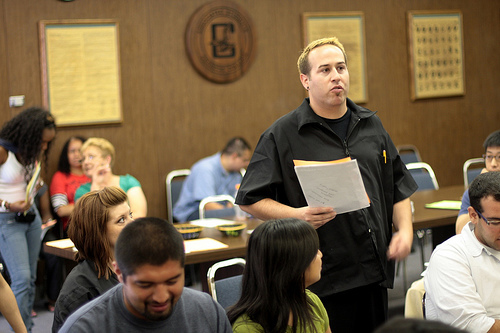Though 46 states will spend an estimated $5 to $12 billion to implement a new set of national education standards called the Common Core, public officials are arranging these standards in hundreds of closed-door meetings.
Meetings between members of the Council of Chief State School Officers to write and discuss these standards and corresponding tests are closed to the public, though taxpayers pay for state officials to attend these meetings and to be CCSSO members.
“[T]he Council of Chief State School Officers holds over one hundred meetings per year,” its meeting webpage states. “CCSSO meetings are closed to the public and attendance is by invitation only unless otherwise denoted” (emphasis in original).
CCSSO and the National Governor’s Association are two nonprofits that coordinated state involvement and adoption of the Core. The Core outlines what states will expect K-12 children to know in math and English/language arts in each grade. Nearly all states adopted them in 2010 within five months of their release, and say they plan to fully implement them, along with matching tests currently in development, by 2014-2015.
“What was behind those policies, what was considered, the different elements that went into them, the ideas that went into them—it’s a black box,” said Bill Allison, editorial director of the Sunlight Foundation, a government transparency watchdog. “The public do have the right to know the laws that are going to affect them and their families, especially when they’re paying for them.”
Supported by State Tax Dollars
State membership in each related CCSSO committee costs $16,000 each year, and states can and do participate in several committees. Committee leader Indiana, for example, participates in the math and social studies committees, where 23 and 10 states, respectively, are members, said Indiana Department of Education spokesman Adam Baker. On its latest financial statement, the CCSSO reported $2,187,626 in revenue from membership dues for all activities in 2011.
Multiply just one membership fee by 46 participating states for a minimum of $736,000 in tax dollars the CCSSO receives each year for an initiative reshaping nearly every textbook, replacing nearly all state tests, overhauling teacher training nationwide, providing the basis to measure teachers, and creating nationwide data repositories for student grades, behavior, attendance, and more.
Despite this monumental impact and tax sponsorship, CCSSO activities are largely hidden to taxpayers because it is a nongovernmental nonprofit. This means its meetings and paperwork are not subject to open records laws that let the public find what their money is funding.
Frustrated Parents
Indiana resident Heather Crossin, whose children attend schools implementing the Core, attempted to attend an October 2012 CCSSO meeting in her Indianapolis hometown. Crossin called Michele Parks, a CCSSO meeting planner, to find out if she could attend. Parks said she couldn’t. Crossin asked to see a list of people on the Social Studies standards writing team. “I was told that was not available for public release,” Crossin said.
Ten weeks entailing dozens of emails and phone calls to at least six CCSSO spokesmen and personnel for access to the Indianapolis meeting or any others at last yielded an email to School Reform News from spokeswoman Kate Dando in December. “Our meetings/sessions at our meetings are open to press really on a case by case basis,” she wrote.
Some reporters have attended some CCSSO meetings, usually on background, she said, which means they cannot directly quote what they hear. Why?
“It’s going to be reported that X state said this about their progress,” Carrie Heath Phillips, CCSSO’s Common Core director, told SRN. “When they have those conversations, we keep that protected, but it depends on the meeting and topic.”
Federal Tax Sponsorship
CCSSO receives tax money from more than state dues. It receives millions from the U.S. Department of Education.
“Approximately 13% and 33% of the Council’s revenue and 25% and 34% of accounts receivable were provided by U.S. Department of Education grants or contracts for fiscal years 2011 and 2010, respectively,” the nonprofit’s 2010-2011 financial statement reads.
Applying the 2011 percentage to that year’s revenues yields an estimated $3,450,930 in CCSSO revenue from the federal government, just in that year. In 2011, $558,000 came from the 2009 stimulus bill for CCSSO’s involvement with one of two networks creating new tests to fit the standards.
In 2010, the U.S. DOE granted those two networks $330 million in stimulus funds. This action, more than any other, led conservative supporters of the Common Core to complain of federal interference in education, a constitutionally protected state function.
‘Outsourcing a Core State Function’
CCSSO and NGA are member organizations for which states pay dues, like the American Legislative Exchange Council, which the left routinely vilifies, said Emmett McGroarty, director of the American Principles Project’s child rights initiative.
NGA would not release member dues information to APP, he said. CCSSO did give basic information about membership costs, but not about what specific states paid.
States have historically created education standards in public meetings, with related documents also a matter of public record, Allison noted.
“The state is outsourcing a core state function to an outside organization that is then outsourcing to other organizations, and you can’t have the parental and legislator input you normally should,” Allison said. “Education is the future, and I do think people have the right to know who is writing the curriculum.”
Image by documentarist.





